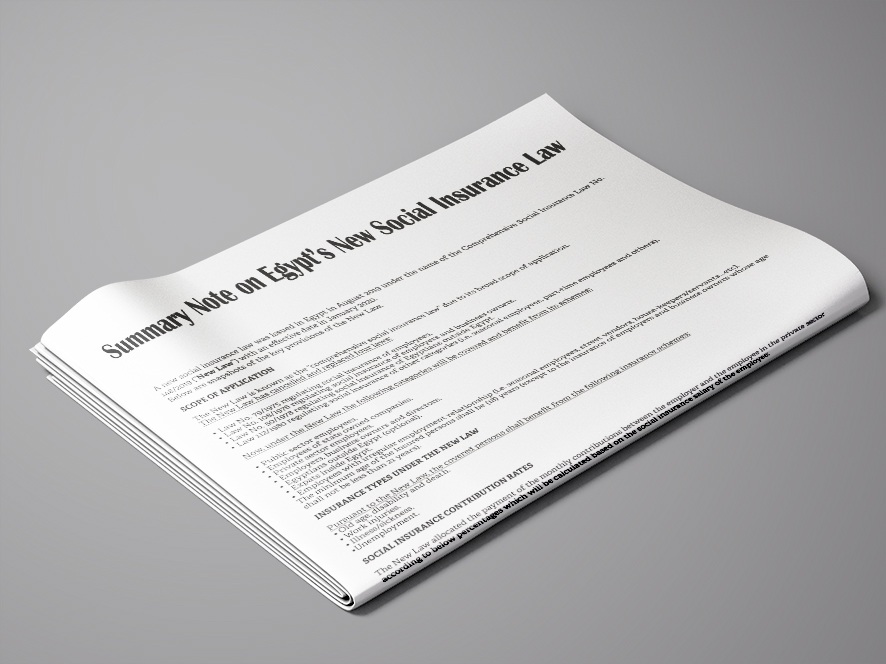
Summary Note on Egypt’s New Social Insurance Law
A new social insurance law was issued in Egypt in August 2019 under the name of the Comprehensive Social Insurance Law No. 148/2019 (“New Law”) with an effective date in January 2020.
Below are snapshots of the key provisions of the New Law.
Scope of Application
The New Law is known as the “comprehensive social insurance law” due to its broad scope of application.
The New Law has cancelled and replaced four laws:
- Law No. 79/1975 regulating social insurance of employees.
- Law No. 108/1976 regulating social insurance of employers and business owners.
- Law No. 50/1978 regulating social insurance of Egyptians outside Egypt.
- Law 112/1980 regulating social insurance of other categories (i.e. seasonal employees, part-time employees and others).
Now, under the New Law the following categories will be covered and benefit from its schemes: - Public sector employees.
- Employees of state owned companies.
- Private sector employees.
- Employers, business owners and directors.
- Egyptians outside Egypt (optional).
- Expats inside Egypt.
- Employees with irregular employment relationship (i.e. seasonal employees, street vendors, house-keepers/servants…etc).
The minimum age of the insured persons shall be (18) years (except to the insurance of employers and business owners whose age shall not be less than 21 years).
Insurance Types under the New Law
Pursuant to the New Law, the covered persons shall benefit from the following insurance schemes:
- Old age, disability and death.
- Work injuries.
- Illness/sickness.
- Unemployment.
Social Insurance Contribution Rates
The New Law allocated the payment of the monthly contributions between the employer and the employee in the private sector according to below percentages which will be calculated based on the social insurance salary of the employee:

What is the ‘Social Insurance Salary’?
The New Law adopted significant change in relation to the definition of the “salary” upon which social insurance contributions (highlighted in the above table) shall be calculated. The distinction between the ‘basic’ and the ‘variable’ insurance salary which existed under old Social Insurance Law No. 79/1975 was cancelled and compiled together to be the “comprehensive insurance salary”.
The comprehensive insurance salary is defined under the New Law to include all actual amounts received by the employee including the fixed salary, incentives, commissions, increments, overtime payments, tips, and any other type of remuneration received by the employee (subject to the below descripted minimum and maximum threshold).
The New Law excludes from the definition of the comprehensive insurance salary certain types of allowances; including travel allowance, transportation allowance, meetings attendance allowance, uniform allowance, housing allowance, car allowance. However, the aggregate value of the excluded allowances shall not exceed 25% of the employee’s comprehensive insurance salary.
The comprehensive insurance salary (upon which the contributions are based) shall be subject to the following minimum and maximum amounts:
- The minimum insurance salary is set at EGP 1,000/monthly (EGP 12,000/per year)
- The maximum insurance salary is set at EGP 7,000/monthly (EGP 84,000/per year)
The above minimum and maximum amounts will be increased 15% each year of the coming 7 years starting from 1st January 2021.
Additional Pension
The New Law stipulates for an additional (optional) pension scheme to employees whose insurance salary exceeds the maximum limit (EGP 7,000/per month) and would like to enhance their pension. In this case, the employee may choose to pay additional contributions to the social insurance authority in order to receive higher pension amount at the time of retirement.
Pension Annual Increase
A new important provision is added to the New Law by which the pension amount paid by the Social Insurance Authority will be subject to annual increase of up to 15% in June of each year.
Raising Retirement Age
Pursuant to the New Law, the retirement age will be increased. The retirement age will remain (60) years until 2032 and then will be increased gradually to be (65) years in 2040.
Increased Sanctions
It is noted that the New Law has harshened the sanctions that will apply on whoever violates its provisions, whether an employer or employee or a governmental officer.
The amounts of the financial fines have been increased under the New Law to be in the range of EGP 20,000 to EGP 100,000 per each committed violation.
Also, the New Law put obligations on employers to disclose correct and accurate information to the representatives of the social insurance authority regarding the number of employees they hire and the actual salaries paid to the employees.
The social insurance authority will also have access to the tax files of the employers in order to obtain correct information in relation to employees’ salaries. Such measures will be adopted by the social insurance authority to prevent employers’ evasion of their obligations under the New Law.
Should you require any clarifications or assistance, please feel free to contact Dr. Eman Riad.
